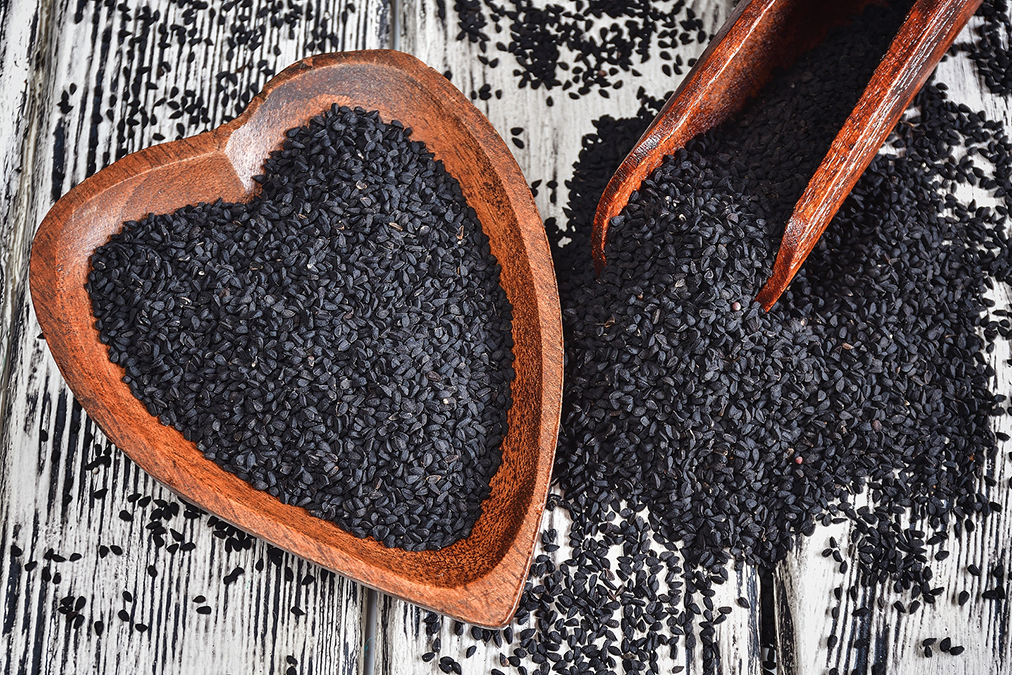 The traditional medical system has no cure for nonalcoholic fatty liver disease (NAFLD).
The traditional medical system has no cure for nonalcoholic fatty liver disease (NAFLD).
You either live with NAFLD and hope for the best or go on strict diets and sweat for hours in the gym (and still, it’s very questionable how effective that is).
So you can imagine the joy that erupted when a new study in the journal Human Nutrition & Metabolism revealed how a simple and common seed can treat NAFLD naturally.
Not only that, it also lowers bad cholesterol and triglycerides and raises good cholesterol levels.
Nigella Sativa (black seed or black cumin) is a seed that grows on a plant native to southwest Asia and the Mediterranean. Its black color has given it the alternative names black seed or black cumin.
It has been popular as an herbal supplement for treating many different health conditions such as asthma and high blood pressure, and scientists have discovered that its most important active ingredient is a chemical called thymoquinone, which is a strong anti-inflammatory agent.
The authors of this new study decided to review already published studies to find out whether this miracle seed can tackle NAFLD.
They found four studies that examine the ability of Nigella Sativa alone to treat NAFLD, not in combination with other treatments. All of these studies were performed on humans.
The studies were all either 8 or 12 weeks long. They used between 44 and 125 subjects ranging in age from their late 30s to their late 40s.
All of these studies used one group treated with Nigella Sativa and one group treated with a placebo. The Nigella Sativa treatments were either two grams, one gram, or 2.5 milliliters daily.
So what did they learn from these four studies?
-
1. Nigella Sativa lowers levels of two liver enzymes that have previously been associated with NAFLD; these are alanine transaminase and aspartate aminotransferase.
2. It lowers LDL cholesterol (the bad type), increases HDL cholesterol (the good type), and lowers triglycerides (fat) in the blood.
3. While it did reduce the participants’ scores on the body mass index, the results were not statistically significant, meaning that it could have been due to chance rather than because of the Nigella Sativa.
4. None of the subjects experienced adverse health effects from the supplement.
This suggests that Nigella Sativa may be a fairly useful and safe treatment for NAFLD, although it may not be a weight-loss agent.
This supplement is relatively widely available. It is usually sold as an oil or in capsule form.

 Overcoming IBD
Overcoming IBD Multiple Sclerosis
Multiple Sclerosis Banishing Bronchitis
Banishing Bronchitis Gum Disease Gone
Gum Disease Gone Overcoming Onychomycosis
Overcoming Onychomycosis Neuropathy No More
Neuropathy No More The Prostate Protocol
The Prostate Protocol Brain Booster
Brain Booster
 Ironbound
Ironbound
 Solution for Shingles
Solution for Shingles
 The Bone Density Solution
The Bone Density Solution
 The Ultimate Healing Protocol
The Ultimate Healing Protocol
 The Parkinson's Protocol
The Parkinson's Protocol
 The Chronic Kidney Disease Solution
The Chronic Kidney Disease Solution
 Overthrowing Anxiety
Overthrowing Anxiety The Fatty Liver Solution
The Fatty Liver Solution The Hypothyroidism Solution
The Hypothyroidism Solution
 The End of Gout
The End of Gout The Blood Pressure Program
The Blood Pressure Program
 The Oxigized Cholesterol Strategy
The Oxigized Cholesterol Strategy
 Stop Snoring And Sleep Apnea Program
Stop Snoring And Sleep Apnea Program
 The Arthritis Strategy
The Arthritis Strategy The Vertigo & Dizziness Program
The Vertigo & Dizziness Program The 3-Step Diabetes Strategy
The 3-Step Diabetes Strategy Hemorrhoids Healing Protocol
Hemorrhoids Healing Protocol The Erectile Dysfunction Master
The Erectile Dysfunction Master Weight Loss Breeze
Weight Loss Breeze The IBS Program
The IBS Program The Insomnia Program
The Insomnia Program The Migraine and Headache Program
The Migraine and Headache Program The Neck Pain Solution
The Neck Pain Solution The Menopause Solution
The Menopause Solution The Ejaculation Master
The Ejaculation Master The TMJ Solution
The TMJ Solution The Acid Reflux Solution
The Acid Reflux Solution The Fibromyalgia Solution
The Fibromyalgia Solution The Psoriasis Strategy
The Psoriasis Strategy